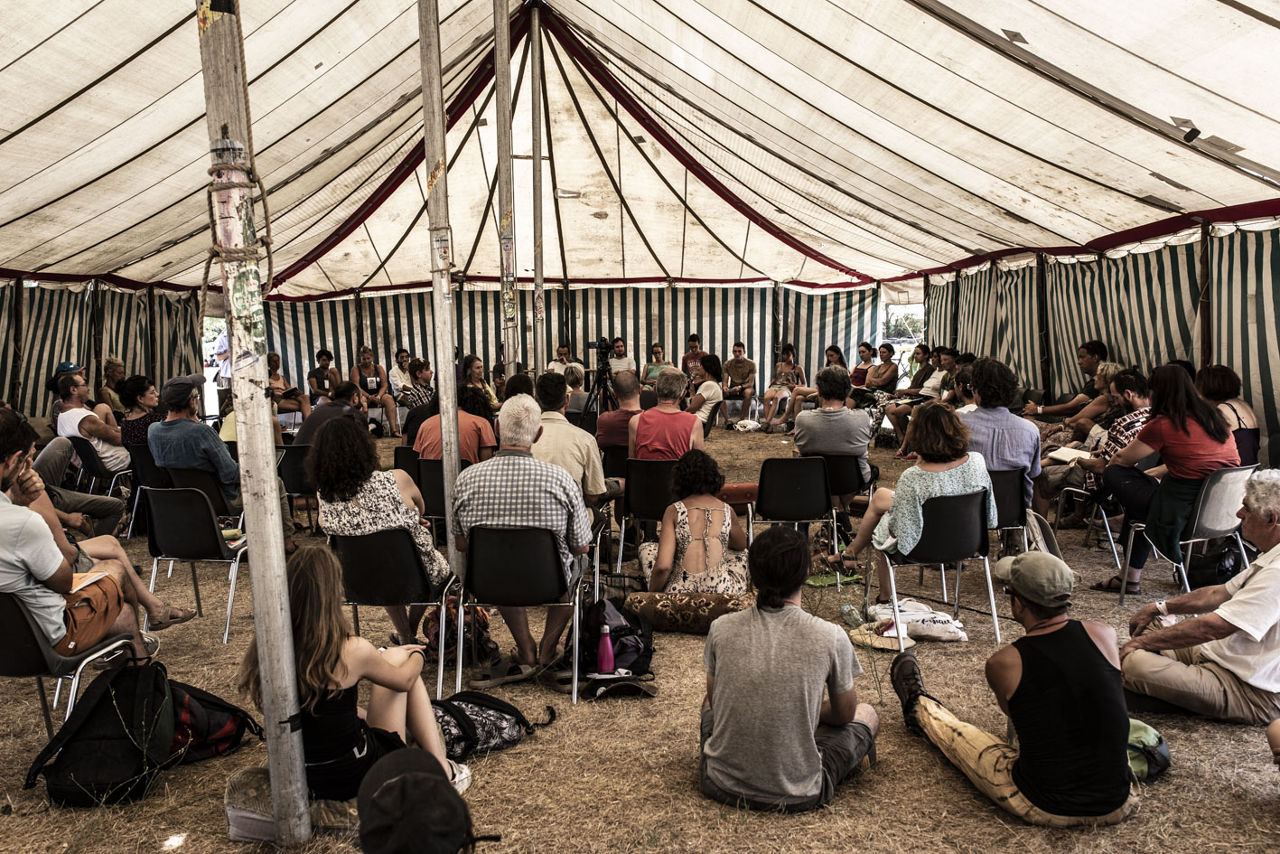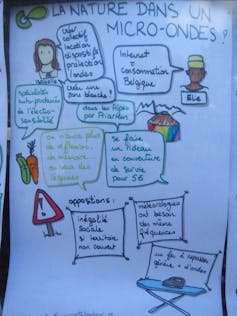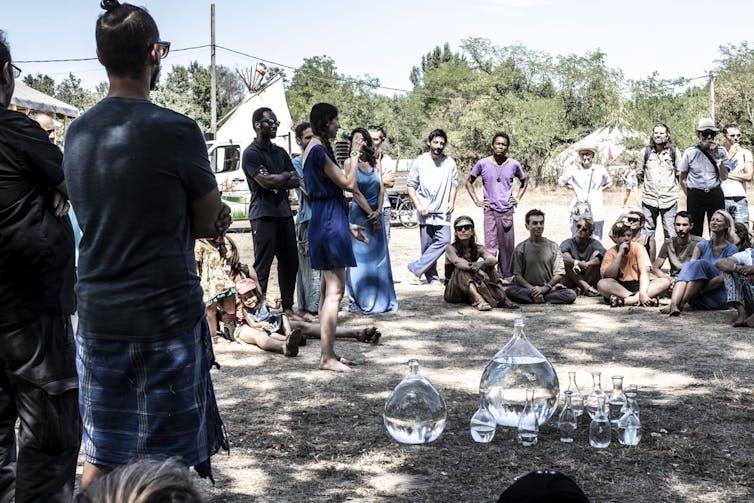How can digital technology change public debate?
Thousands of people march in France every year, whether they are "yellow vests" or not, to demand that their voices finally be heard in public debate and, above all, taken into account. What if their voices could be amplified and multiplied tenfold through digital tools?
Jean Sallantin, University of Montpellier; Antsa Nasandratra Nirina Avo, University of Fianarantsoa; Mathieu Lafourcade, University of Montpellier and Véronique Pinet, University of Montpellier


This article is published as part of the upcoming Science Festival (October 5–13, 2019 in mainland France and November 9–17 overseas and internationally), of which The Conversation France is a partner. The theme of this year's festival is "See you tomorrow: telling the story of science, imagining the future." Find all the debates and events in your region on the Fetedelascience.fr website.
Our experiments with digital debate tools have shown that formalization and the use of artificial intelligence (AI) bring a rationality to debates that enhances their effectiveness.
Thus, the digital debate will be a factor influencing democratic life if it enables a greater number of citizens to participate directly in public debate and if it avoids the biases currently encountered in face-to-face debate and discussion sites.
The pitfall of traditional debate
As it is difficult to follow a debate involving a large number of participants, it would be desirable to develop artificial intelligence that assists everyone in studying and following the debates.
The work of rationalization, formalization, and the use of AI in the digital debate must show that it is an effective and controlled tool. We will introduce this approach and its tools by illustrating it with the debates from the Terre de convergence eco-meeting, which took place from August 13 to 18 in Attuech (30).

Sébastien Pichot/Terre de convergence, Author provided
The art of calculating well
Argumentation is related to logic, the "art of thinking correctly," rhetoric, the "art of speaking well," and dialectics, the "art of conversing well," but to date it is not "the art of calculating well."
However, two computational operations, indexing and classification, are used to structure the arguments in a debate. Indexing an argument here means determining which terms in the French language are associated with it. Classifying the arguments in an argumentation groups them into subclasses characterized by the common terms that index them. The artificial intelligence methods used here treat all arguments equally. They reveal the incompleteness of the argument by grouping together arguments that appear irrelevant to participants, prompting them to complete the argument with new arguments or by indexing the existing arguments more precisely; there is no possibility of deleting arguments here.
This is a classic scientific approach that is used here for the arguments in debates. Scientists correct their own arguments by reviewing the work of their peers and guiding their doctoral students, but they cannot systematically do this for arguments in a science/society debate if they have no way of identifying those that specifically relate to their area of expertise.
The mathematical formalization of digital debates focuses in particular on these processes of argument indexing and classification, as it must demonstrate why the techniques used are capable of effectively guiding participants to clarify and complete the set of arguments.
The mathematical formalization of digital debate uses topos to establish the artificial intelligence methods used to structure debates.

Sébastien Pichot/Terre de Convergences, Author provided
The convergence ground debates
The Terre de convergence eco-meeting is a project led by the Ministry for Ecological and Solidarity Transition. Around 2,000 people and 200 associations took part. These meetings and the use of collaborative digital tools aim to initiate networking among local transition stakeholders.

Sébastien Pichot/Terre de Convergence, Author provided
The Terre de Convergence debates focus on issues relating to energy, the environment, waste, food, solidarity, etc. They take into account the dimensions of personal development and community life, local and global issues, and politics, ranging from genuine citizen participation to the ongoing questioning of representatives. The digital debates have prepared the ground for the face-to-face debates and will continue to do so by broadening the audience.
Debates highlight citizens' desire to participate in decision-making on territorial transition, a moratorium on 5G,collective housing, and the context and challenges of energy transition.
Participants also addressed topics that may seem more distant at first glance: the situation of indigenous peoples, a topic made even more relevant by the fires in the Amazon. And finally, collaborative digital technology.
To understand the role of digital technology and AI in the digital debate, we invite you to join us for a discussion of a text by Edgar Morin.
Survivalism as an example
To illustrate the role of AI, let's consider an argument made in this debate concerning survivalism.
The IDEFIX indexing software is based on web data acquisition software called JeuxDeMots. IDEFIX will be used to index this argument based on all French terms associated with it in the context of the "Terre de convergence" debates, thereby enabling participants to see how their argument relates to other arguments in all debates indexed by one of the associated words.
Let's show the sequence of operations that will be used to index the argument as relating to the theme of survivalism.
Argument text = "Survivalism is the end of community life and a return to small groups that exclude life in society."
Terms of the argument = * survivalism * end of community life * return to * small * group * groups * small group * exclusionary * excluding * life in society
Context in the eco-meeting (max=30) = * end of life in society | 3,257 * group of people | 2,585 * natural disaster | 2,242 * health crisis | 2,155 * collapse of industrial civilization | 2,044 * survivalism | 1,867 * economic crisis | 1,702 • th=0.5 • min=10 • max=20 • number of ideas=1326
"Survivalism" was not initially a term used in the context of the argument. Therefore, a reinforcement learning technique is used to raise its ranking, along with other terms that will rise at the same time.
Terms for indexing the argument: group • end of society • group of people • natural disaster • health crisis • collapse of industrial civilization • survivalism • economic crisis • life • survivalist •

Land of convergence, Author provided
Eliminate erroneous coincidences
To further refine the completeness of the argument, WEBRA, a machine learning software program developed by the CNRS, performs a formal concept analysis, highlighting coincidences between terms indexing the arguments in the current debate. When a debate has few arguments, it produces many erroneous coincidences such as the following: small_finite_groups+ and survivalist+. We then know that we need to enrich the set of arguments in order to eliminate this erroneous coincidence. In this way, they provide effective entry points for a rapid deepening of the debate.
Many public debates concern issues such as territorial transition due to climate change. They are largely open to the public and involve connecting the arguments of citizens, associations, politicians, and scientists.
For such debates to take place, artificial intelligence is needed to compensate for the human inability to read, index, and classify everything. However, the methods used by this AI must verify mathematical principles that ensure arguments are treated equally. In addition, this AI must demonstrate its ability to learn from arguments in order to appropriately solicit contributions from debate participants (it therefore does not intervene in the debate).![]()
Jean Sallantin, Emeritus Research Director at the CNRS, University of Montpellier; Antsa Nasandratra Nirina Avo, Research-teacher Mathematical modeling of argumentation, University of Fianarantsoa; Mathieu Lafourcade, artificial intelligence, natural language processing, automated reasoning, inference, machine learning, University of Montpellier and Véronique Pinet, Professor of Philosophy, University of Montpellier
This article is republished from The Conversation under a Creative Commons license. Readthe original article.